Power of the people invaluable in China's fight against Covid-19
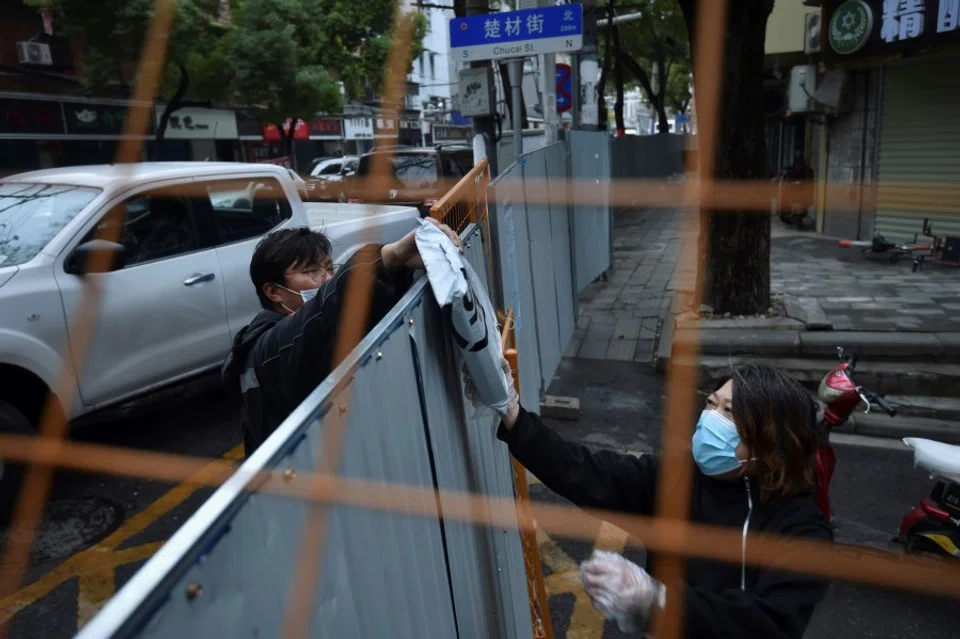
Most people take it for granted that the government should be responsible for governing the country and managing all matters of public interest. However, governance issues are becoming more complex and the needs and interests of the people more diverse.
Since the 1990s, public management theories have emphasised the importance of mobilisation beyond that of the government. Governance in recent years requires the government, private enterprises and social organisations to cooperate with each other and leverage on their respective strengths. Comparable to a three-legged stool, each and every leg is indispensable. This new form of governance has gained further support in the recent efforts by Wuhan to control the Covid-19 epidemic.
It allows us to observe how the government handled this crisis single-handedly in the initial stages when private firms and non-governmental organisations were basically kept inactive.
Responding to the severe Covid-19 epidemic, Wuhan implemented a lockdown of the city on 23 January 2020 to stamp out further viral transmission. The lockdown virtually stopped the operation of business firms and social organisations, and made it impossible for societal actors from other regions of the country to contact people in Wuhan directly. It allows us to observe how the government handled this crisis single-handedly in the initial stages when private firms and non-governmental organisations were basically kept inactive.
Undoubtedly, China's centralised government has the remarkable ability to mobilise and manage resources at its disposal. Within a short time of the lockdown, the government dispatched some ten thousand medical personnel and considerable medical supplies from all over the country to Wuhan. In just two weeks, Huoshenshan Hospital and Leishenshan Hospital, each equipped with about a thousand beds, were built and commenced operation. Following this, 16 makeshift hospitals were built to treat tens of thousands of mild Covid-19 cases. After a month of hard work, the hospitals in Wuhan are now able to admit all Covid-19 patients for treatment, leading to effective control of the epidemic.
A highly centralised national system possesses the advantage of effectively achieving a single policy objective. However, although the Wuhan lockdown was meticulously planned, there were inevitable oversights in its implementation due to different perceptions on goals and information asymmetry in the process. This points to the vital and indispensable role of private enterprises and social organisations in public governance.
...the government ordered that all donated supplies had to be centrally managed by the Wuhan branch of the Red Cross Society of Hubei, which had insufficient manpower and lacked experience.
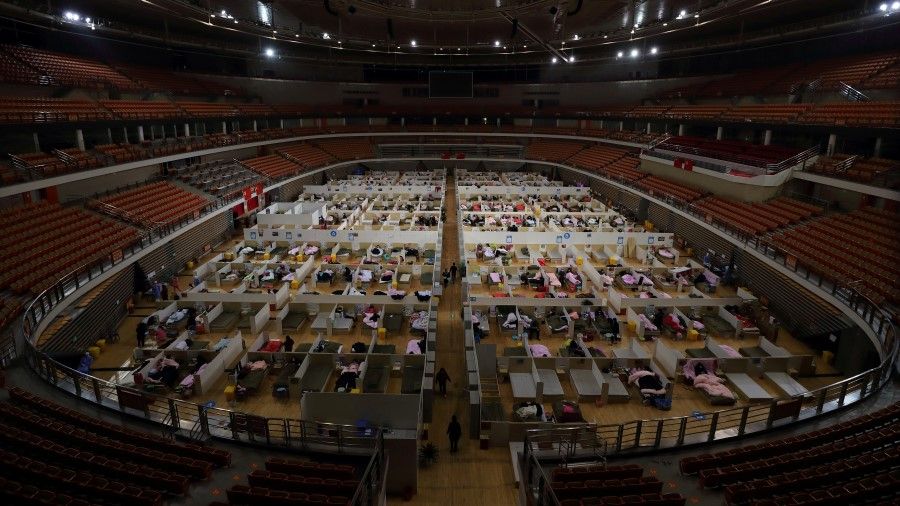
The vital role of enterprises
As the epidemic rapidly broke out in Wuhan, medical supplies were in acute shortage. When donated supplies suddenly came in from all parts of the country, it created a logistic bottleneck, and donors and their designated hospitals had to rely on volunteers to resolve delivery problems. Furthermore, the government ordered that all donated supplies had to be centrally managed by the Wuhan branch of the Red Cross Society of Hubei, which had insufficient manpower and lacked experience. As a result, logistics was paralysed, and the donated supplies were stranded in warehouses and remained undistributed to the frontline medical personnel who needed them most urgently. Eventually, the government had to ask a private pharmaceutical logistics company to take over the processing of the donated supplies and their distribution. Easing the logistical bottleneck, the private enterprise professionally processed and distributed the emergency supplies within two hours of their arrival.
The above example illustrates the importance of enterprise participation in matters of public interest. This model was subsequently used again when government organisations from Chongqing, Shandong and other provinces donated nearly 1,000 tons of vegetables to Wuhan. As vegetables are perishable and difficult to store, they would quickly rot in the warehouse if they were not quickly dispatched. The Wuhan Municipal Bureau of Commerce decided to hand over the donated vegetables to three major commercial supermarkets for sale at a fair price, with the collected revenue turned over to the Wuhan Municipal Bureau of Finance Affairs as funds for epidemic control. In addition to avoiding complicated distribution schemes, this innovative model also reduced unnecessary wastage and transaction costs. Although the sale of donated vegetables raised some eyebrows, people could understand the reasons for doing so when it was explained.
Another problem caused by the Wuhan lockdown was that the local medical personnel were unable to rely on public transportation to and from work. Solving this problem needed the support of enterprises. A ride-hailing company organised volunteer drivers to pick up doctors and nurses to and from work, while other companies provided shared bicycles and electric cars for those who lived nearer to the hospitals.
Wang Yong, a SF Express deliveryman and a ride-hailing driver, mobilised other ride-hailing drivers to voluntarily provide transport services for doctors and nurses to and from work. He also discovered the meal provision problem, and organised volunteers to provide instant noodles and hot water to the medical personnel.
The importance of cooperation between the public and private sectors is underlined by the examples above. In fact, as contributing to society becomes more commonplace, many companies are setting up corporate social responsibility departments to deal with matters of public interest.
The indispensable role of social organisations
Social organisations have the advantages of their proximity to the people, timely problem detection and operational flexibility, which enable them to play an indispensable role in public governance. Their participation in the fight against the epidemic in Wuhan was mainly initiated and organised by volunteers.
Medical personnel from other parts of China were housed in hotels, which unfortunately did not provide meals after the lockdown. The problem of meal provision for these medical personnel had to be solved. Wang Yong, a SF Express deliveryman and a ride-hailing driver, mobilised other ride-hailing drivers to voluntarily provide transport services for doctors and nurses to and from work. He also discovered the meal provision problem, and organised volunteers to provide instant noodles and hot water to the medical personnel. He even arranged for restaurants, eateries and convenience stores to provide free meal boxes in the effort to solve the meal provision problem for 7,800 medical personnel. Liu Xian, a Sichuan volunteer from the post-90s generation, went to Wuhan with her colleagues and delivered 500 meal boxes daily to the medical personnel of some hospitals designated for treating Covid-19 patients, sustaining this effort for a month.
As sanitary panties were not among the government's specified items for consolidated procurement, the convenience of the transportation green channel was inapplicable. The volunteers had to find a way via the ubiquitous WeChat groups to deliver them.
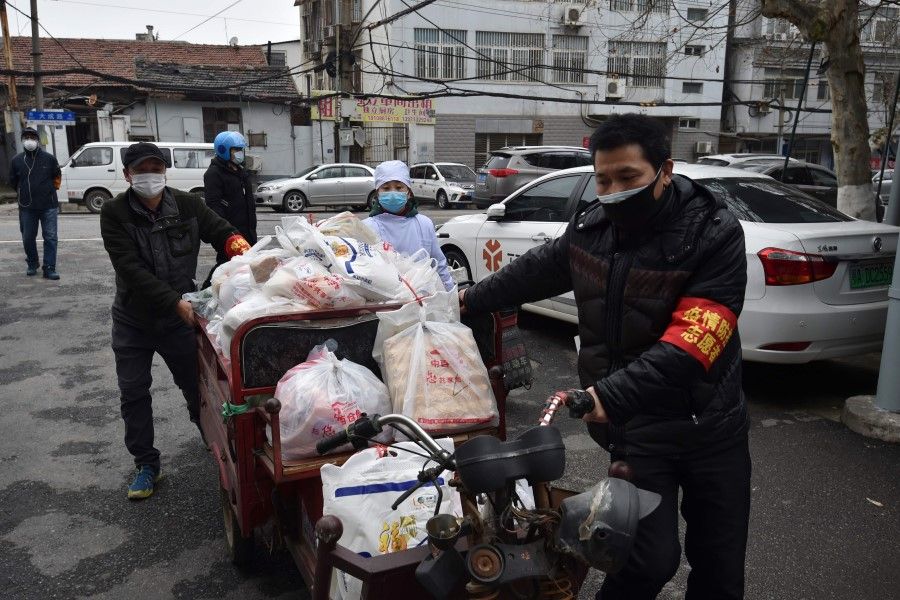
Volunteers and social organisations further took the initiative to solve the medical personnel's problems that were not anticipated by Wuhan's special anti-virus command centre. Netizen Liang Yu watched the televised images of medical personnel don protective gear, goggles, gloves and socks, and immediately realised the needs that female medical personnel would have when they had their periods. Upon enquiring online, she found out that the actual demand for sanitary pads was huge and was specifically for the more durable sanitary panties instead of ordinary sanitary pads. Liang Yu immediately worked with the Lingshan Charity Foundation from Wuxi to launch "Sisters' Relief Action in the Battle Against Epidemic" (姐妹战疫安心行动), an online fundraising campaign for donation of sanitary panties for medical personnel. She organised a team of volunteers to seek donations from the society at large and sanitary pad manufacturers, and call the hospitals to send out forms to consolidate demand, including the required sizes of sanitary panties. Within a month, from 7 February to 2 March 2020, the campaign succeeded in coordinating the donation of 550,000 pairs of sanitary panties and 300,000 pairs of disposable underwear.
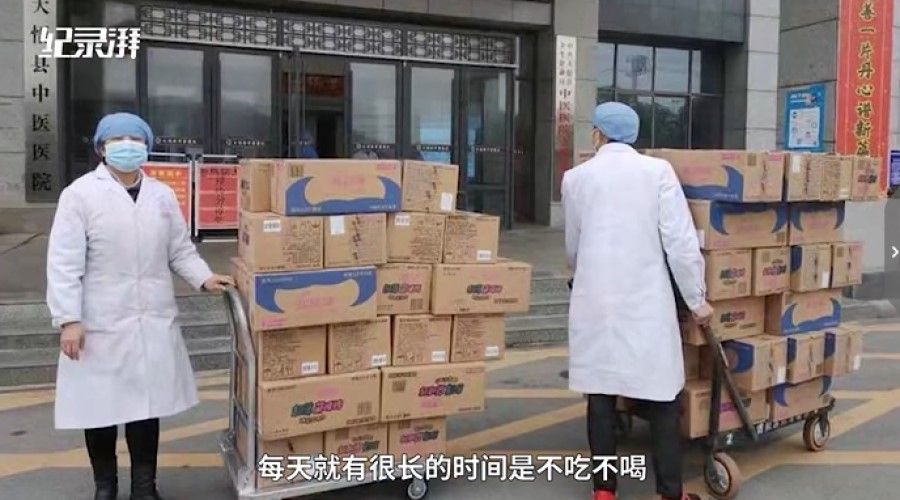
As sanitary panties were not among the government's specified items for consolidated procurement, the convenience of the transportation green channel was inapplicable. The volunteers had to find a way via the ubiquitous WeChat groups to deliver them. By detailing the delivery requirements in these chat groups, Liang Yu and her volunteers managed to always find local volunteers to deliver. The campaign was also supported by enterprises, including manufacturers that donated sanitary panties and logistics companies that provided free delivery.
As the fight against the epidemic is all-important, the frontline medical personnel naturally became the society's focus. However, the epidemic also caused the postponement of surgeries for other patients and dialysis for patients with kidney failure. With the Wuhan lockdown, traffic restrictions were imposed, and outpatient clinics and pharmacies were closed, resulting in difficulties for chronic disease patients to purchase medication. Wu You, a young middle school teacher, found out about this problem and initiated a voluntary medication delivery team of e-scooter riders to purchase and deliver medication for more than 600 patients who needed help.
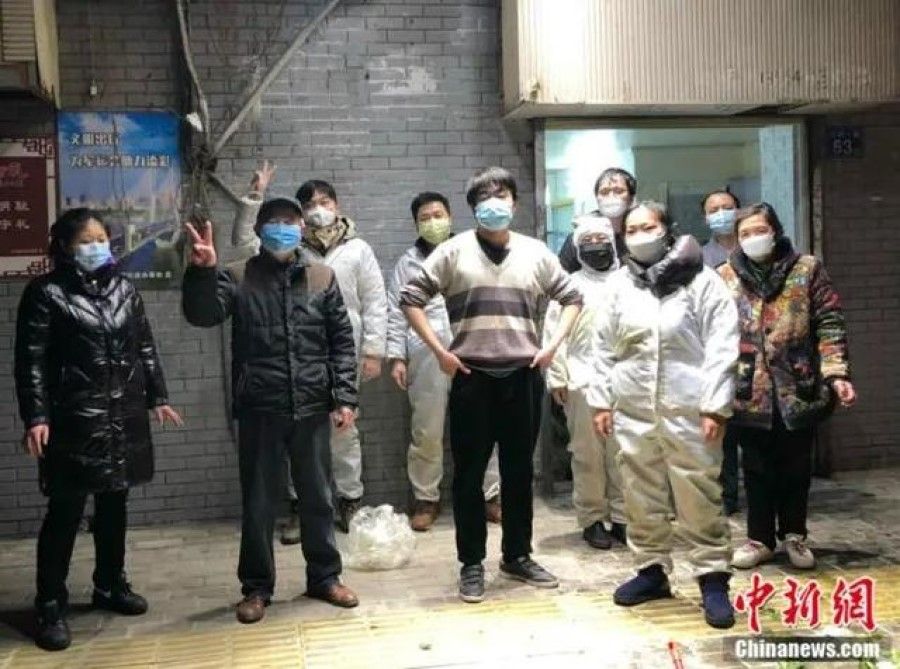
Wuhan's fight against the epidemic is unsustainable without the participation of the countless volunteers, social organisations and enterprises.
The Wuhan lockdown also caused great inconvenience to many migrant workers, who had originally planned to return home to celebrate the Lunar New Year. Having given up their rented rooms and daily necessities, they found themselves marooned in various parts of the city. They could neither go home nor find accommodation or food in the cold winter. Volunteers in Wuhan brought them solace by bringing food and distributing surgical masks.
Thousands have died in the epidemic in Wuhan. Having encountered so many deaths, psychologically traumatised Wuhan residents could seek free counselling services via hotlines set up by volunteer counsellors from Wuhan, Sichuan, Shanghai and Beijing.
Volunteers could initiate social participation, but their efforts remained uncoordinated, and their ability to verify information and organise resources was also lacking.
Fang Fang, a Wuhan writer trapped in the lockdown, wrote in her diary: "The Wuhan lockdown was hurriedly executed, like a large bucket that is without a bottom and full of holes and cracks. The government spared no effort to secure the bucket's bottom, but was powerless to do anything about the holes and cracks. We have to offer our thanks to the countless, amazing young volunteers who plugged the holes and sealed the cracks." Evidently, it is impossible for the government to spearhead and implement everything. Wuhan's fight against the epidemic is unsustainable without the participation of the countless volunteers, social organisations and enterprises.
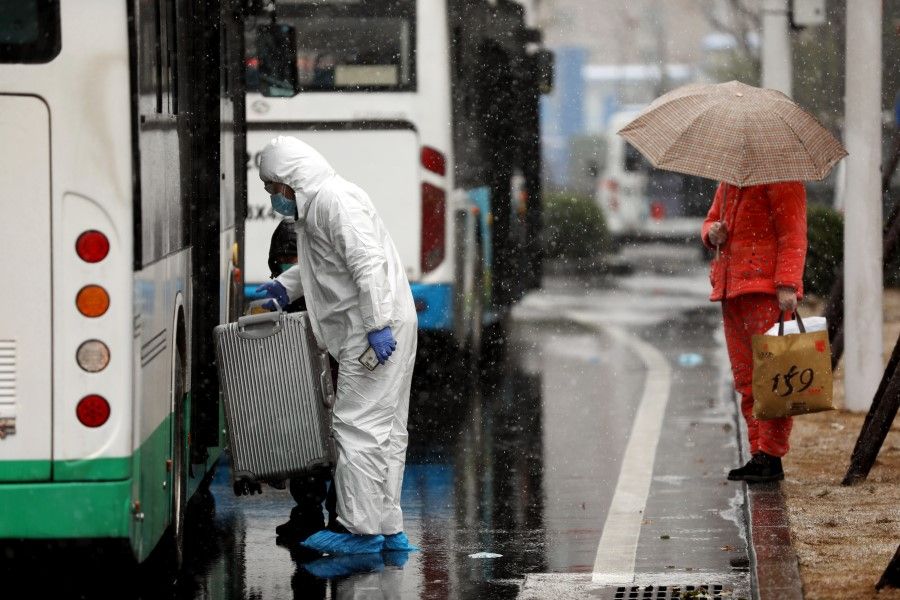
The Wuhan experience also shows that while the people's civic consciousness and social participation have increased after the country's economic reforms, their efforts remain disorganised due to regulatory barriers. Volunteers could initiate social participation, but their efforts remained uncoordinated, and their ability to verify information and organise resources was also lacking. For example, some volunteers who wanted to help stranded people expended considerable effort to coordinate the transport and distribution of supplies, only to discover upon arrival that the intended recipients were no longer at the destination.
On the other hand, without social organisations, the efficiency of the government was also reduced. Having decided to comprehensively trace all COVID-19 cases, the government found that there were insufficient community workers, so it organised tens of thousands of volunteers to work in the communities. Many volunteers questioned the need to spend time travelling to other communities, when they could do the same work in their own communities. Obviously, this could have been more effectively and efficiently accomplished with the cooperation of social organisations in the communities.
For now, the Wuhan lockdown continues. Enterprises, social organisations and volunteers are still quietly contributing to matters of public interest and providing public goods that are in short supply. In the process, they provide invaluable lessons on public governance.
